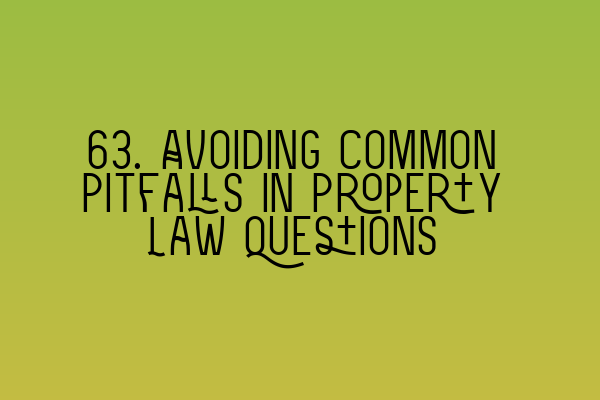63. Avoiding Common Pitfalls in Property Law Questions
Welcome to the SQE Property Law & Land Law blog, where we provide valuable insights and tips to help you excel in property law examinations. In today’s post, we will discuss common pitfalls that students often encounter when tackling property law questions. By avoiding these pitfalls, you can enhance your understanding, improve your exam performance, and ultimately, achieve success.
1. Lack of Understanding: One of the key mistakes students make is not fully grasping the fundamental concepts of property law. It is essential to have a solid understanding of the basic principles, such as ownership, rights, and obligations relating to land and property. Without a strong foundation, it becomes difficult to apply the law correctly in problem-solving scenarios. To strengthen your understanding, we recommend engaging in SQE 1 Practice Exam Questions, which can help you reinforce your knowledge.
2. Failure to Analyze: Another pitfall is failing to analyze the problem question thoroughly. It is crucial to read the question carefully, identify the relevant facts, and apply the law accordingly. Often, students overlook significant details, leading to incorrect conclusions. Take your time to critically analyze the information provided and consider all possible implications. Practicing with SQE 1 Practice Mocks FLK1 FLK2 can improve your analytical skills and enhance your ability to spot relevant issues.
3. Inadequate Research: Property law is a complex area with a vast array of legislation, case law, and principles. Failing to conduct thorough research can hinder your ability to provide accurate and well-supported answers. Make use of authoritative textbooks, legal journals, and online resources to gather relevant information and precedents. SQE 2 Preparation Courses offer comprehensive materials that can guide your research process and provide you with the necessary resources.
4. Lack of Structure: Structure plays a vital role in effectively presenting your knowledge and arguments. Failing to organize your answer can result in a fragmented response that lacks clarity and coherence. To overcome this challenge, consider using headings and subheadings to structure your answer. This will help you convey your points in a logical and organized manner, making it easier for the examiner to follow your line of reasoning. SQE 1 Preparation Courses can assist you in developing your structuring skills through detailed guidance and practice materials.
5. Misunderstanding of Terminology: Property law encompasses a wide range of technical terms and phrases. Misinterpreting or misusing these terms can lead to significant misunderstandings and errors. It is crucial to familiarize yourself with the correct definitions and understand the precise meanings in the context of property law. Our comprehensive glossary of property law terms can serve as a valuable resource to enhance your knowledge and ensure accurate usage.
As an aspiring property lawyer, it is essential to be aware of these common pitfalls and take proactive steps to address them. By improving your understanding, research skills, analytical abilities, structuring techniques, and terminology proficiency, you will be better equipped to handle property law questions with confidence.
Remember that practice is key to success. Make use of resources such as SQE 1 Practice Exam Questions and SQE 1 Practice Mocks FLK1 FLK2 to sharpen your problem-solving skills and gain familiarity with the types of questions you may encounter in the SQE exams. By following these tips and dedicating yourself to diligent preparation, you can excel in your property law examinations.
For more information about SQE exams, preparation courses, and important dates, visit our website and explore our comprehensive resources: SRA SQE Exam Dates.
Stay tuned for more valuable insights and guidance on property law and land law in future blog posts. Happy studying!
Disclaimer: This blog post is provided for informational purposes only and does not constitute legal advice. Always consult with a qualified solicitor or legal expert for specific property law questions and concerns.
Related Articles:
– SQE 1 Practice Exam Questions
– SQE 1 Practice Mocks FLK1 FLK2
– SQE 2 Preparation Courses
– SQE 1 Preparation Courses
– SRA SQE Exam Dates
